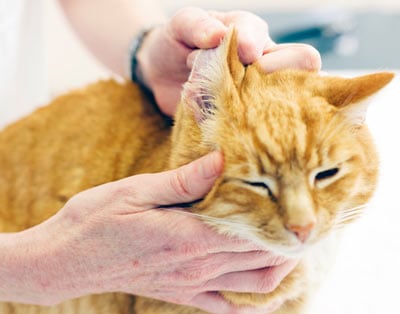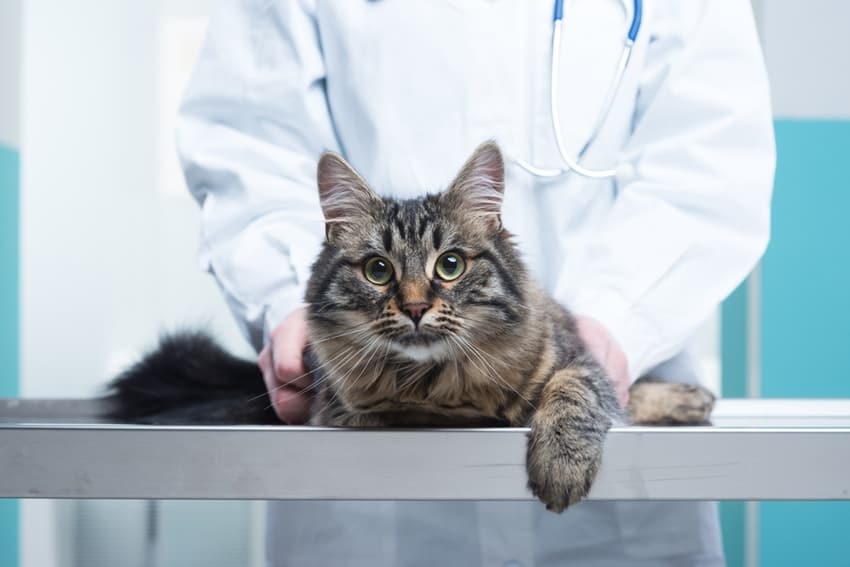A hematoma in cats is referred to as a restricted collection of blood outside the blood vessels.
A seroma is similar, except that the accumulation of fluid contains just the serum, without the red blood cells.
While seromas and hematomas may happen anywhere in a cat’s body, we are specifically going to discuss ear hematoma in cats here. What are its causes, symptoms, prognosis, and treatments?
Hematoma in Cats: What is this feline condition?

The visible outer part of the cat’s ear, which is mostly affected by hematoma, actually plays a significant role in the hearing function.
It collects the sound waves, distillates them, as well as funnels through the middle and the inner ear.
While it’s possible that a cat aural hematoma may resolve on its own, the issue causes a lot of discomfort and may take several weeks to heal. A quick visit to the veterinarian is will more than likely be necessary.
Ear hematoma (aka auricular hematoma or aural hematoma) is a common ear problem in felines. It’s a painful condition, which results when a certain blood vessel breaches and fluid and blood fill the part in between the cartilage and skin in the ears.
Additionally, a mild to major ear swelling may occur within minutes of the rupture. In case it’s not promptly treated, the condition may result in an long term deformity.
Causes of Cat Hematoma
Ear Hematomas are brought on by other events or conditions. The most common causes are:
- Constant ear scratching
- Ear wounds
- Banging head against something
- Blood clotting disorders
- Chronic allergies
- Ear mites
- Chronic ear infections
Symptoms of Cat Hematoma
The main symptom of an ear hematoma is swelling in the outer area of the ears. This may range from a small bulge, up to an extreme swelling, which resembles a balloon.
Further, the condition usually only occurs on one ear. The cat will likely show signs of pain, exhibit head shaking and scratching, and might tilt their head to only one side.
Treatment for Cat Hematoma

This condition is very easy to diagnose, especially with a physical exam.
It is recommendable that you go and seek vet attention for ear hematomas as soon as possible.
Further, small hematomas habitually grow in size. The larger the hematoma, the longer for it to heal. Curing the condition early may result in a much better chance of full recovery.
The pain that is due to ear hematoma in cats may likely diminish in a day or two. When left without treatment, the ear will reabsorb the fluid eventually, and the illness may resolve itself.
Nonetheless, this isn’t recommended. The area affected may keep on being swollen and the scar tissue may develop, thus leaving behind an unappealing condition, which is often referred to as the cauliflower ear.
There are various treatment options readily available. The vet may choose which is the right one, depending on the hematoma’s size.
Non-Surgical Treatment
The vet might choose non-surgical intervention if the hematoma is small.
A needle will be inserted into the area affected, in order to remove the fluid, as well as a drainage tube that might be inserted. This particular method is less effective and may result in the hematoma reoccuring.
It’s commonly recommended only for cats that cannot tolerate general anesthesia.
Surgery Without Sutures
After the fluid in the ear has drained out, it’ll be taped with a rolled bandage and be left to heal.
The owners may be needed to be much more watchful with the rehabilitation since the wound hasn’t been closed.
This option is generally used on the show cats as there is less of a chance of ear deformity or scarring after the treatment.
Surgery with Sutures

This is actually the most common among the treatments for an aural hematoma in cats.
The cat will be placed under general anesthesia and a small lesion will be made underside the ear. The fluid will then be allowed to drain and sutures will be placed on the affected area.
This doesn’t just treat the hematoma, but also helps in preventing the reoccurrence of the condition.
Aural Hematoma Cat
Whatever the case with your cat, we hope they are soon feeling better. Sick, injured, or otherwise unwell cats are not what we want!
A visit to the vet is always the best practice when you noticed your cats displaying signs of pain. Better safe than sorry!









